Huance Xu
Disentangled Graph Social Recommendation
Mar 14, 2023Abstract:Social recommender systems have drawn a lot of attention in many online web services, because of the incorporation of social information between users in improving recommendation results. Despite the significant progress made by existing solutions, we argue that current methods fall short in two limitations: (1) Existing social-aware recommendation models only consider collaborative similarity between items, how to incorporate item-wise semantic relatedness is less explored in current recommendation paradigms. (2) Current social recommender systems neglect the entanglement of the latent factors over heterogeneous relations (e.g., social connections, user-item interactions). Learning the disentangled representations with relation heterogeneity poses great challenge for social recommendation. In this work, we design a Disentangled Graph Neural Network (DGNN) with the integration of latent memory units, which empowers DGNN to maintain factorized representations for heterogeneous types of user and item connections. Additionally, we devise new memory-augmented message propagation and aggregation schemes under the graph neural architecture, allowing us to recursively distill semantic relatedness into the representations of users and items in a fully automatic manner. Extensive experiments on three benchmark datasets verify the effectiveness of our model by achieving great improvement over state-of-the-art recommendation techniques. The source code is publicly available at: https://github.com/HKUDS/DGNN.
Collaborative Reflection-Augmented Autoencoder Network for Recommender Systems
Jan 10, 2022



Abstract:As the deep learning techniques have expanded to real-world recommendation tasks, many deep neural network based Collaborative Filtering (CF) models have been developed to project user-item interactions into latent feature space, based on various neural architectures, such as multi-layer perceptron, auto-encoder and graph neural networks. However, the majority of existing collaborative filtering systems are not well designed to handle missing data. Particularly, in order to inject the negative signals in the training phase, these solutions largely rely on negative sampling from unobserved user-item interactions and simply treating them as negative instances, which brings the recommendation performance degradation. To address the issues, we develop a Collaborative Reflection-Augmented Autoencoder Network (CRANet), that is capable of exploring transferable knowledge from observed and unobserved user-item interactions. The network architecture of CRANet is formed of an integrative structure with a reflective receptor network and an information fusion autoencoder module, which endows our recommendation framework with the ability of encoding implicit user's pairwise preference on both interacted and non-interacted items. Additionally, a parametric regularization-based tied-weight scheme is designed to perform robust joint training of the two-stage CRANet model. We finally experimentally validate CRANet on four diverse benchmark datasets corresponding to two recommendation tasks, to show that debiasing the negative signals of user-item interactions improves the performance as compared to various state-of-the-art recommendation techniques. Our source code is available at https://github.com/akaxlh/CRANet.
Global Context Enhanced Social Recommendation with Hierarchical Graph Neural Networks
Oct 08, 2021
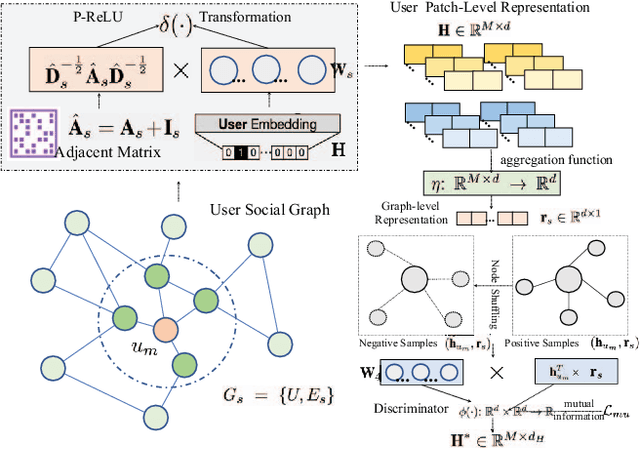
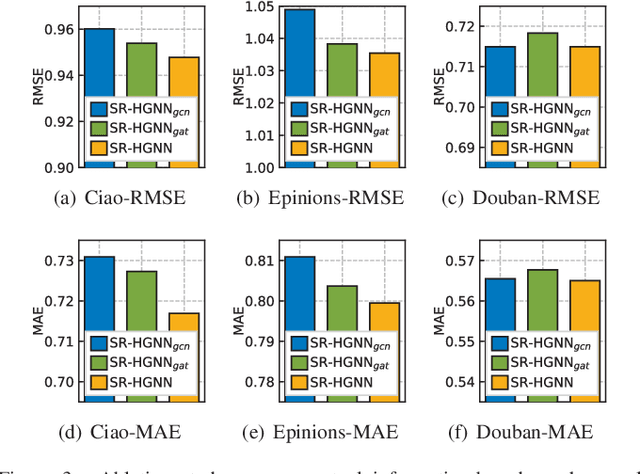
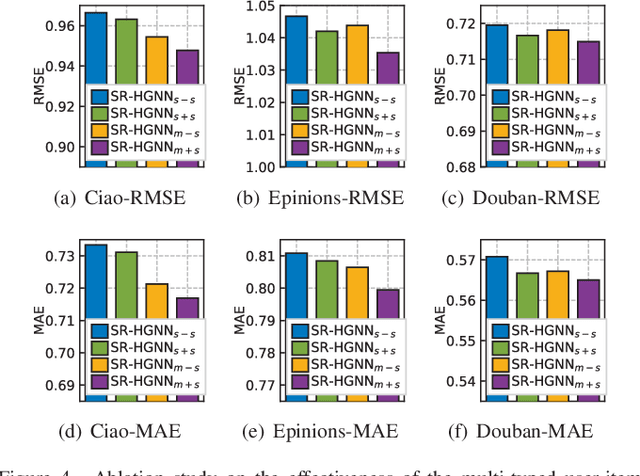
Abstract:Social recommendation which aims to leverage social connections among users to enhance the recommendation performance. With the revival of deep learning techniques, many efforts have been devoted to developing various neural network-based social recommender systems, such as attention mechanisms and graph-based message passing frameworks. However, two important challenges have not been well addressed yet: (i) Most of existing social recommendation models fail to fully explore the multi-type user-item interactive behavior as well as the underlying cross-relational inter-dependencies. (ii) While the learned social state vector is able to model pair-wise user dependencies, it still has limited representation capacity in capturing the global social context across users. To tackle these limitations, we propose a new Social Recommendation framework with Hierarchical Graph Neural Networks (SR-HGNN). In particular, we first design a relation-aware reconstructed graph neural network to inject the cross-type collaborative semantics into the recommendation framework. In addition, we further augment SR-HGNN with a social relation encoder based on the mutual information learning paradigm between low-level user embeddings and high-level global representation, which endows SR-HGNN with the capability of capturing the global social contextual signals. Empirical results on three public benchmarks demonstrate that SR-HGNN significantly outperforms state-of-the-art recommendation methods. Source codes are available at: https://github.com/xhcdream/SR-HGNN.
Knowledge-aware Coupled Graph Neural Network for Social Recommendation
Oct 08, 2021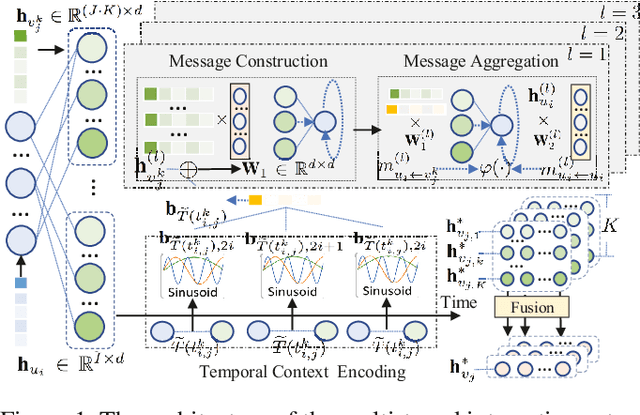

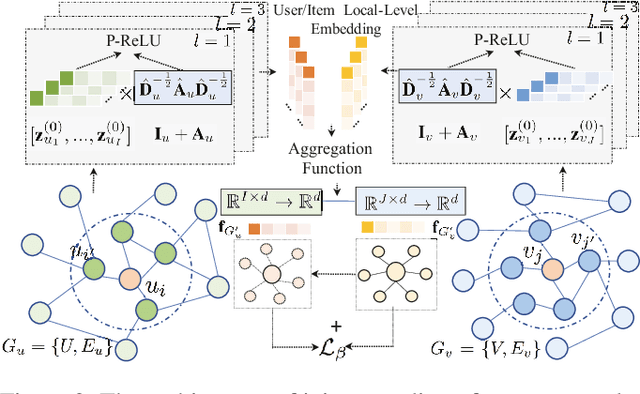

Abstract:Social recommendation task aims to predict users' preferences over items with the incorporation of social connections among users, so as to alleviate the sparse issue of collaborative filtering. While many recent efforts show the effectiveness of neural network-based social recommender systems, several important challenges have not been well addressed yet: (i) The majority of models only consider users' social connections, while ignoring the inter-dependent knowledge across items; (ii) Most of existing solutions are designed for singular type of user-item interactions, making them infeasible to capture the interaction heterogeneity; (iii) The dynamic nature of user-item interactions has been less explored in many social-aware recommendation techniques. To tackle the above challenges, this work proposes a Knowledge-aware Coupled Graph Neural Network (KCGN) that jointly injects the inter-dependent knowledge across items and users into the recommendation framework. KCGN enables the high-order user- and item-wise relation encoding by exploiting the mutual information for global graph structure awareness. Additionally, we further augment KCGN with the capability of capturing dynamic multi-typed user-item interactive patterns. Experimental studies on real-world datasets show the effectiveness of our method against many strong baselines in a variety of settings. Source codes are available at: https://github.com/xhcdream/KCGN.
Social Recommendation with Self-Supervised Metagraph Informax Network
Oct 08, 2021



Abstract:In recent years, researchers attempt to utilize online social information to alleviate data sparsity for collaborative filtering, based on the rationale that social networks offers the insights to understand the behavioral patterns. However, due to the overlook of inter-dependent knowledge across items (e.g., categories of products), existing social recommender systems are insufficient to distill the heterogeneous collaborative signals from both user and item sides. In this work, we propose a Self-Supervised Metagraph Infor-max Network (SMIN) which investigates the potential of jointly incorporating social- and knowledge-aware relational structures into the user preference representation for recommendation. To model relation heterogeneity, we design a metapath-guided heterogeneous graph neural network to aggregate feature embeddings from different types of meta-relations across users and items, em-powering SMIN to maintain dedicated representations for multi-faceted user- and item-wise dependencies. Additionally, to inject high-order collaborative signals, we generalize the mutual information learning paradigm under the self-supervised graph-based collaborative filtering. This endows the expressive modeling of user-item interactive patterns, by exploring global-level collaborative relations and underlying isomorphic transformation property of graph topology. Experimental results on several real-world datasets demonstrate the effectiveness of our SMIN model over various state-of-the-art recommendation methods. We release our source code at https://github.com/SocialRecsys/SMIN.
 Add to Chrome
Add to Chrome Add to Firefox
Add to Firefox Add to Edge
Add to Edge